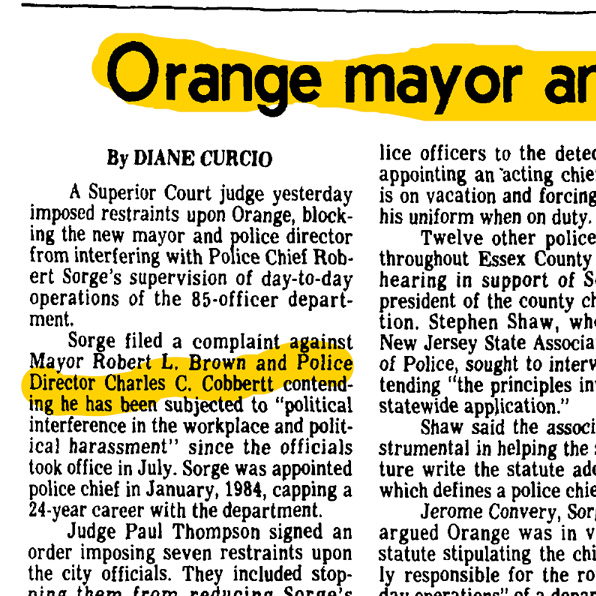A Superior Court judge yesterday imposed restraints upon Orange, blocking the new mayor and police director from interfering with Police Chief Robert Sorge's supervision of the day-to-day operations of the 85-officer department.
Sorge filed a complaint against Mayor Robert L. Brown and Police Director Charles C. Cobbertt contending he has been subject to "political interference in the workplace and political harassment" since the officials took office in July. Sorge was appointed police chief in January, 1984, capping a 24-year career with the department.

Judge paul Thompson signed an order imposing seven restraints upon the city officials. They included stopping them from reducing Sorge's $57,498 salary to $42,000; assigning police officers to the detective bureau, appointing an acting chief when Sorge is on vacation and forcing him to wear his uniform when on duty.
Twelve other police chiefs from throughout Essex County attended the hearing in support of Sorge, who is president of the county chiefs' association. Stephen Shaw, who represents New Jersey State Association of Chiefs of Police, sought to intervene also contending "the principles involved are of statewide application."
Shaw said the association was instrumental in helping the state Legislation write the statue adopted in 1981 which defines a police chief's authority.
Jerome Convery, Sorge's attorney, argued Orange was in violation of a statue stipulating the chief is "directly responsible for the routine day-to-day operations" of a department.
Cobbertt was a police lieutenant before he was appointed director on July 5. In his complaint, Sorge charged Cobbertt never sought a leave of absence from his $37,541 Civil Service post and continues to collect that salary in addition to a $2,000 stipend as police director.
The new director named police union leader as his confidential aide, Sorge noted, contending the appointment "bypasses the chain of command for sworn police personnel who must be subordinate to the chief of police." Sgt. Charles Penta, president of the Orange Police Superior Officers Association, is the aide to the police director.
Under the Brown administration, Sorge contended his office has been moved, his secretary fired, his mail is being screened and he no longer has access to a police car for personal use. The chief also complained he has been instructed to be on the job from 8 a.m. to 4 p.m. and maintain a daily log of his whereabouts.
Robert Westreich, who said he will be serving as special counsel to Orange for the case, argued the city intends to dispute every allegation raised by Sorge. Thompson set a full hearing on the matter for Oct. 13.
Westreich said the mayor had rescinded his order to reduce Sorge's salary.
But the attorney said "the plaintiff's problem from Day One has been he doesn't believe the director has any authority over him and he's fundamentally wrong." Westreich said the Administrative Code of Orange, which was adopted in 1976, states the police department shale be headed by a director. But in response to Thompson's questions Westreich conceded the code does not specify the duties of the director.
Cobbertt attended the hearing and afterwards denied Sorge's allegations of interference. "I'm trying to give the department the best working conditions, bring back the morale and integrity of the department," said the new director.
In the past year, two Orange officers have faced criminal charges, involving theft and endangering the welfare of a boy. In February, five officers including Cobbertt and Penta filed suit against the city and Sorge over sick leave requirements.
Thomas Vena, an assistant city attorney, said the mayor and council are reviewing the administrative code and the police portion will probably be amended.
Westreich said the city wants Sorge to be in the office between 8 a.m. and 4 p.m. so he can be available to the elected officials "The city can't fuction if the police chief is going to Whitehouse Station (Sorge's home) 30 miles away from here during the hours when the elected officials are in their offices," said the attorney.
Convery argued Sorge must be free to set his own hours, depending on his responsibilities as the city's top lawman. The hours of Sorge's workday is one of the items to be resolved during the hearing.
“Reach Back with One Hand and Pull Someone Else Up With You.”
– Charles C. Cobbertt
Explore more of the inspiring stories of Charles C. Cobbertt.